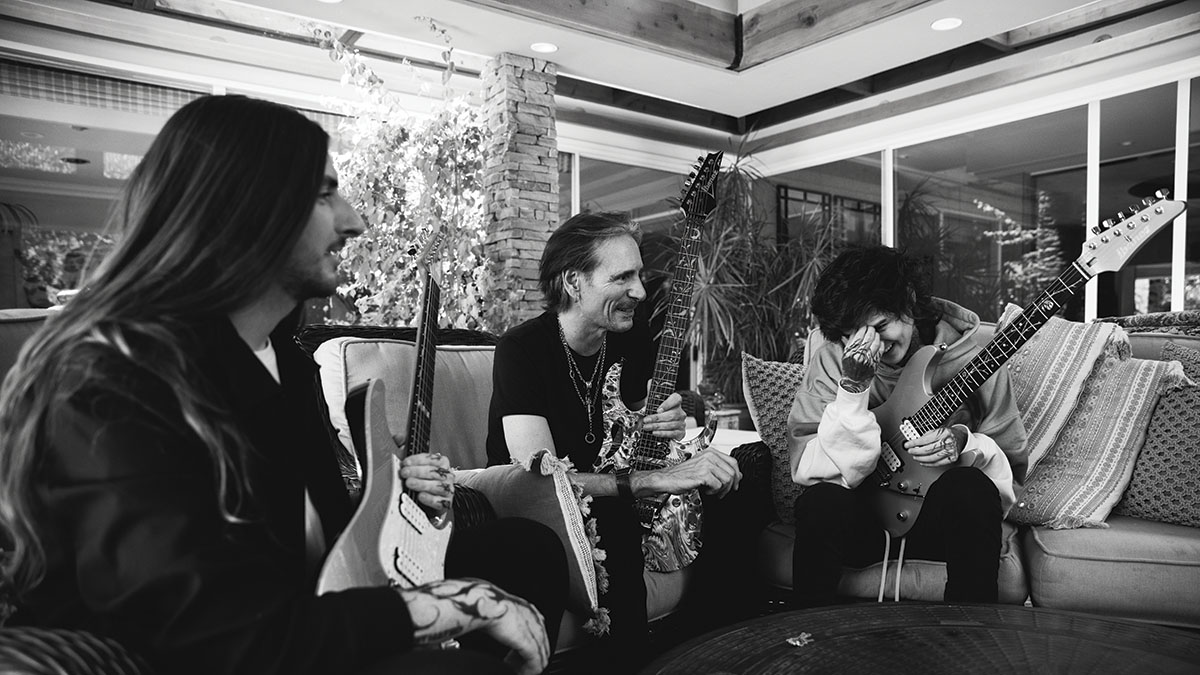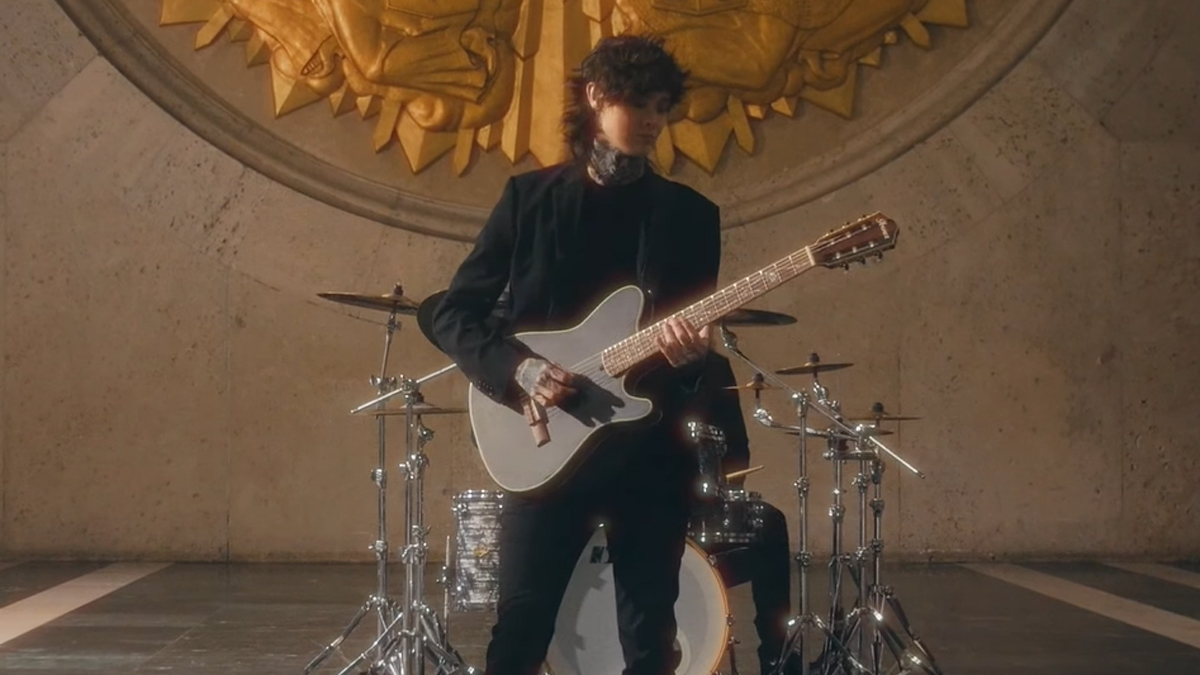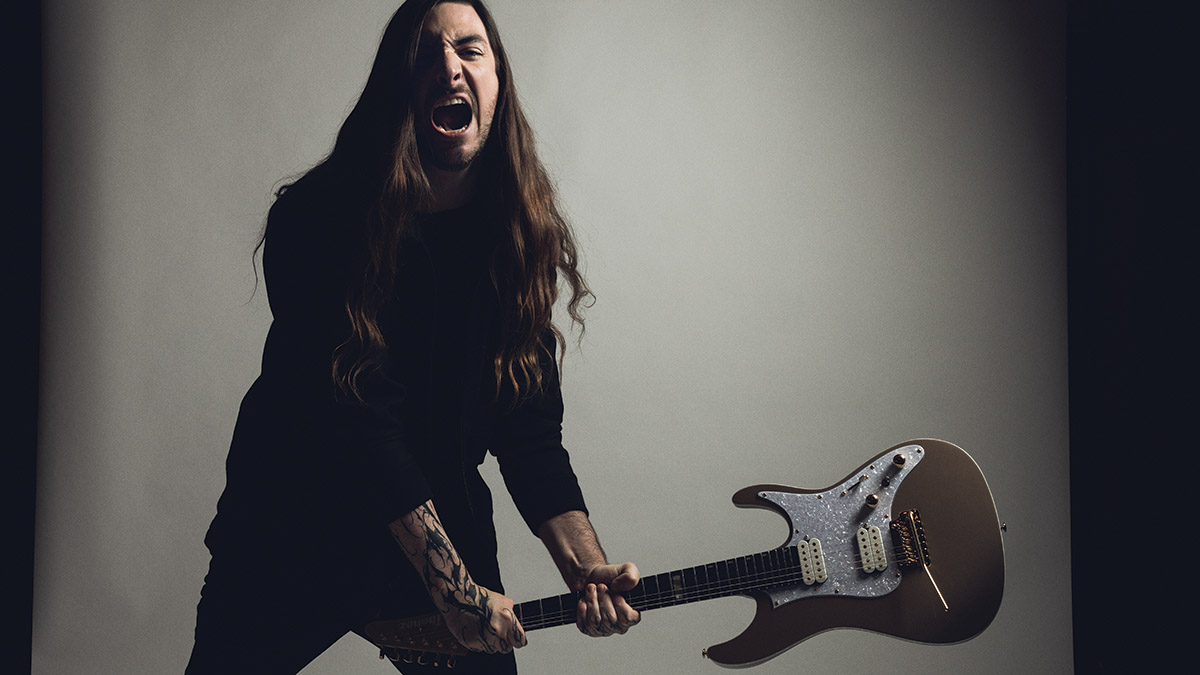Polyphia’s Tim Henson and Scott LePage sit down with Steve Vai to discuss their epic collaboration, the evolution of awe-inspiring technique and a one-of-a-kind guitar gift
The Polyphia x Steve Vai collaboration on Ego Death is one of the standout guitar moments of 2022. This is the story of how it all came together, from the first encounter to chopping up the guitar master's solo – and how the prog prodigies plan to tackle it all live…

Listeners on a nonstop thrill ride throughout Remember That You Will Die, Polyphia guitarists Tim Henson and Scott LePage knew that their album closer, Ego Death, had to be a doozy of a definitive statement. And who better to aid them in their conquest than a guy who knows a little something about knockout grandeur – their guitar hero, Steve Vai?
“When Steve agreed to play on our song, it just blew my mind,” Henson says. “You know, right there I could just check off a box on my ‘dreams come true’ list.”
“And then it actually happened. We got the track back, and we’re like, ‘Yep, that’s actually Steve Vai playing on our music,” LePage says. “You’re listening to it and you think, ‘OK, it doesn’t get much cooler than that, does it?’”
Seated beside them is Steve Vai himself. He looks down, smiles appreciatively and appears to blush. “Oh, my God. That’s so sweet,” he says. The guitarist has just returned from a whirlwind tour of Europe, his first time out on the road since 2019, and as it turns out, Polyphia are just days away from starting their first tour in as many years.
Despite the tight time frame in their schedules, the three gathered together during a summer afternoon at Vai’s own Harmony Hut home studio for a Guitar World photo shoot, after which they sat down for a Zoom chat about their recent collaboration.
“You know, these guys talk about being honored to have me play on their song, which is very nice to hear,” Vai says, “But the truth is, I’m also honored. It’s definitely a two-way street here.”
Now it’s Henson and LePage who are blushing. It’s as if they still can’t believe this is all happening. “You can call us fanboys,” Henson says with a laugh. To which LePage adds, “I will allow that for myself as well.”
Get The Pick Newsletter
All the latest guitar news, interviews, lessons, reviews, deals and more, direct to your inbox!
Henson recalls the first time he heard Vai, back when he was 10 and just starting on the guitar. “My dad showed me Crossroads,” he says. “This was right after I saw School of Rock. When that little kid Zack shredded a guitar solo, I was like, ‘That’s so fucking badass.’ My dad said, “You like that? Watch this.’
“So we watched Crossroads, with the guy from The Karate Kid playing guitar, and there was Steve as the devil’s guitar player. It just blew me away. From there, I just went down the rabbit hole. Steve’s Tender Surrender video – I still watch that today. Yeah, big fanboy here.”
Oddly enough, LePage’s first exposure to Vai also came about because of his father. “My dad started playing guitar as a teenager,” he says. “He would buy records and he’d get tablature books to go with them. He did that whole thing where he’d pick the turntable needle up, go back to a part and learn it. He’d even slow records down. He told me he did that with Steve Vai and Randy Rhoads records. Then when I started playing guitar, that’s the stuff we listened to.”
Henson and LePage admit they were intimidated at first to meet Vai – their initial encounter occurred at a 2019 NAMM show – but within moments they realized their hero wasn’t some aloof, cooler-than-thou figure; he was friendly and approachable, and perhaps more important, he was interested in what they were doing.
“Something else struck me at that NAMM Show,” Henson says. “It was the way everybody talked about Steve – they all had such great things to say about him. It made me think, ‘I’ve got to stop being such a shit ass.’ I wanted people to talk about me the same way.”
It was the way everybody talked about Steve – they all had such great things to say about him. It made me think, ‘I’ve got to stop being such a shit ass.’ I wanted people to talk about me the same way
Tim Henson
Vai is well aware of the pedestal young guitarists put him on. He’s dealt with it for years, starting from the time he joined Frank Zappa’s band at age 19.
“At first, people come up to you and they’re all freaked out,” he says, “You think, ‘Why are they acting so weird?’ But then you realize that what you’re doing means something to them. It matters in their lives.”
As for how he attempts to demystify his persona and put people at ease, he says, “I just try to be as normal as I can. I’m just Steve.” He laughs. “Despite everything people might see on the outside, I’m really just a normal family guy.”
He looks at Henson and LePage.
“You guys will get your share of that,” he says. “You’re developing a whole new vocabulary on the guitar, and there are people who are hungry for that. I’m old enough that I’ve been able to see a couple of evolutions go by, and it’s time for a new evolution.”
Henson and LePage nod thoughtfully. They look ready for what comes next.

Tim and Scott, can you elaborate a little on how Steve Vai figured into your development as guitar players?
Tim Henson: “Like I mentioned, the Tender Surrender video is one of my favorite videos of all time. I watch it and try to emulate the circular vibratos. Even Steve’s facial expressions – when you watch my videos, I’m pretty stoic, but when I’m on stage and I’m doing solos from old songs, that’s where you’ll see that come out of it. I get that from Steve.”
Scott LePage: “If I hear anybody doing something cool on the guitar, like if I scroll on Instagram and see a guitar video, I’ll stop and go, ‘Wow. How did that get that sound?’ When it comes to Steve, I think the biggest takeaway I got from his playing was his use of harmonics and the whammy bar, the way he can make it sing in tune with one fret. He can bend it any which way and still hit the right notes. It’s not just how some people make it go ‘Woo-woo!’ With Steve, it’s way more musical. It’s a composer thing.”
Steve Vai: “You guys are very good to me.”
Steve, you’ve certainly listened to a lot of guitarists in your time. What were your first impressions of Polyphia when you first heard them?
Vai: “What struck me was how surprised I was, but also how wrong I was, about where I thought things might go. When I was younger and was learning from people who were influencing me, I had visions of how I thought the guitar might develop. I always felt like there was always going to be an underground movement of people who wanted to do extraordinary things on those damn six strings – or seven or eight.
“I didn’t know how it would evolve, but when the seven-string and eight-string thing started, along with that whole underground, djent-heavy movement –that real shred-shred stuff – I thought, ‘Yeah, that makes sense.’
Out-of-the-box thinking for the sake of being creative. That’s really the only way to truly evolve
Steve Vai
“Then I heard these guys, and it was just completely from left field. It was obvious to me that somebody was approaching it outside of the box, outside the norm, because they were mixing so many different elements – clean tones, fingerstyle, interval skips, dynamics, incredible depths of dynamics, syncopation that was unique and unheard before. I thought, ‘This is a monolith kind of a shift that’s happening.’
“I couldn’t quite figure out how they were doing it. I watched the videos and I saw that it was real. I had a conversation with Tim, and he told me about how he started to develop some of these techniques and flavors. And it was exactly what I thought – out-of-the-box thinking for the sake of being creative. That’s really the only way to truly evolve.
“You have to be able to follow your independent desires without any excuses or fears that it’s not going to work. The other thing I would mention is that all of this is fine and good, but it’s limited unless there’s melody. With these guys, I hear sublime melody, and that really lit me up. I heard it from the beginning.”

A lot of that out-of-the-box spirit comes from you, Steve. You might not realize it, but you’re a real influence to guys like Tim and Scott.
Vai: “I think people are attracted to seeing other people being their quirky selves, because it’s encouraging. I think maybe they saw some of that, but I see it in them, too. It’s a dual mentoring of sorts. It always is, because you can’t see another performer and not somehow be influenced or inspired.”
But with you, even though some players want to emulate elements of your style, you give them the inspiration to be themselves.
Vai: “Well, yes. If somebody was interested in being like me, the best way to do that is to find out who they are. Because you don’t want to play like me – there’s no authenticity in it. If somebody’s interested in doing that, fine, but some people just don’t have a choice. These guys, when they’re creating, they have to be authentic to their true selves. We’re all standing on the shoulders of everybody who came before us. I’m just a little flavor in their massive palette of colors.”
You don’t guest on many records, Steve. Do you have any kind of criteria for collaborations?
Vai: “It’s changed through the years, but these days my go-to thought is, ‘With the remainder of time I have left, I’m only doing my music,’ because that’s what fills me up the most. That is, unless something comes along that’s interesting and extraordinary and I feel that I can contribute to it in an effective way.
“Also, if somebody is interested in having me do something, they have to know I’m not good at taking direction. We know that: ‘OK, this is Vai and we don’t know what’s going to happen here.’ When the invite came down from these guys, I was so tickled, man. I was like, ‘I don’t care what it is, I’m playing on it.’ They’re doing such beautiful and unique stuff – I wanted to get a little piece of it somehow.”
They’re doing such beautiful and unique stuff – I wanted to get a little piece of it somehow
Steve Vai
But I thought you were initially hesitant. You loved the track Ego Death, but you didn’t know what you would do on it.
Henson: “There was a time concern, because you were about to leave for a tour.”
Vai: “Yeah. And nothing takes me five minutes, especially on something like this. They gave me this big, long section.”
Henson: “It was huge.”
Vai: “And they said, ‘Do what you do and build it up.’ And I thought, ‘OK…’ I’m such a different player, because their stuff has such smooth but sharp edges – it’s really sparkly and clean. And I’m just a delay-drenched, singing guitar melody guy, so I didn’t want to do something that was inappropriate for them. This was special, but the way we play is so different, and I didn’t want to give them something that would pollute their track.”
LePage: “We didn’t feel that way at all.”
Henson: “We were ecstatic.”
Vai: “But this is the way I was thinking. I wanted to give them something that worked. And then I thought, ‘Well, maybe that’s it. The difference in the playing, I should exemplify that.’ So when I started laying stuff down, I just thought, ‘Do that long legato stuff you do, and it’ll add a nice contrast.’ And it did.”
Henson: “I think we did tell him, ‘Like Tender Surrender,’ just because we love that song so much. [Laughs] As for any other direction, because the whole thing builds and drops, we were just like, ‘Build it up so that you can go fucking crazy on this part.’ It was kind of vague. At the end of the day, we wanted Steve to be Steve. That’s what we were looking for.”
One of the things I love about what they do is their delicate, hidden melodies. They’re so charming and touching
Steve Vai
Steve, how many passes did you do on the track?
Vai: “It took a while because it was special to me. I had to decide what I was going to do that wasn’t just going to be the same thing that I would normally do. I wanted it to be dimensional. I listened to the track quite a bit.
“As I mentioned, one of the things I love about what they do is their delicate, hidden melodies. They’re so charming and touching. I listened very carefully and I took a bunch of those melodies. Everything I did had some kind of a shadow of melodies I found in the track, the whole first [he sings a part] – that’s them, basically, with me just mangling it a bit. I thought that was a nice way to fuse things. [Laughs] And then they put it through the Polyphia blender.”
Henson: “Yeah, we did! [Laughs]”

I understand you were taken aback by how much they chopped your parts up.
Vai: “Well, what happened was, usually when I do something for somebody, they just take it the way it is. These guys are very creative, and they like to manipulate things. Which is fine. I told them, ‘Do whatever you like. Here’s what I’ve got.’”
Henson: “He did say that. In his email, he wrote, ‘Do whatever you’d like with this.’”
Vai: “I wanted them to do it. It didn’t really matter – it’s not sacred. It was chopped in a way that met their creativity demands, and I wouldn’t want them to do anything else. When I first heard it, though, it was so different. I thought, ‘Maybe they didn’t like what I did.’ [Laughs]”
Henson: “Oh no! That wasn’t it at all.”
LePage: “No, not at all.”
Henson: “We just had so many new things.”
Vai: “And then I thought, ‘No, this is just the way that they work.’ At first, I felt uncomfortable saying, ‘Featuring Steve Vai,’ because I thought, ‘Well, I didn’t really do anything.’ I didn’t feel like I really contributed something, and then when I listened to it again, I said, ‘Of course. It was just a stupid humility kind of a thing,’ so I apologize for that.”
Henson: “No, that’s all right.”
LePage: “It actually helped us complete the song. Once we got his part and messed around with what he did, we wrote more to it.”
Henson: “Yeah. Because what we sent him was the first half of the song, which was done. The second half of the song was an empty beat. Once we had his stuff, then we realized we needed to back him up. It’s like puzzle pieces, or like you’re chiseling away at a marble sculpture. We don’t really know what we had until we got Steve’s part, and then we realized, ‘Oh, shit. Here we fucking go.’ And then we started going away at it.”
LePage: “At first, it was like, the first third of the song was Tim’s section, the second third was mine, and we knew the third section was going to be Steve’s.”

But as you guys told me earlier, the finished version on the record wasn’t so massively chopped up.
Henson: “This is part of the creation process; you can go a ways and then come back in a tasteful way. Once we realized we changed too many things, we put it back the way it was, but we still changed it just a little bit. We needed to get it to where we could add our stuff, and once that was there, we could revert it back.”
LePage: “It’s almost like a hybrid between the original and what we sent you, Steve.”
Vai: “Oh, OK.”
Henson: “We brought it backwards to be closer to the original.”
Vai: “And you’re happy with it?”
Henson: “Oh, we love it.”
LePage: “Oh yeah. It’s fantastic.”
Vai: “I listened to it and I love it. I love it! It sounds like we’re playing together. It’s not just ‘Steve playing along on a track.’ It really feels integrated.”
Henson: “It’s one of our best songs.”
Vai: “Really? Wow!”

Henson: “We thought we were going to film the music video, and we were like, ‘Fuck, we’ve got to learn this crazy fucking song.’ And Scott said, ‘Dude, you know we’re gonna have to play it live.’”
LePage: “It is one of our best songs.”
Have you been rehearsing it? Are either of you going to play Steve’s parts?
Henson: “Well, right now, at the time we’re speaking, it’s before the album comes out, so the tour we’re doing in a few days won’t be the Remember That You Will Die tour; it’s just a tour where we get to preview new music, which means we won’t have to perform Ego Death.
“We probably won’t play it till November when we’ll be in Europe. Obviously, we’d love to take Steve with us, but he’s got his own obligations. What we’ll probably do is end up splitting Steve’s parts between us: ‘I’ll take this section. Scott’ll take this section,’ and vice versa until we complete.”
Vai: “Hey, if I’m ever in the same town, I’m there, brother.”
LePage: “Yeah!”
Steve, when I spoke earlier with Tim and Scott, they told me the greatest story about the first time they came to your house. They were so excited to hang out with you, but after they left they realized that they didn’t get a picture with you.
Vai: “Oh, right! And they texted me like, ‘Can we come back?’ [Laughs] To tell you the truth, I should have thought of it myself. In fact, I did think that, but oddly enough, I didn’t want to intrude. I know that sounds odd. So when they texted me, I said, ‘Yeah, sure, come back. That’d be great.’”
Henson: “I can’t believe we had the audacity to do that fucking text.”
Vai: “It was great. It was great. Oh, but I have a story. [Looks at Tim and Scott] Can I…?”
Henson: “Yeah, go for it.”
[Vai gets up and goes to another part of the studio.]
Henson: “This is so cool…”
[Vai comes back holding a stunning, futuristic-looking solidbody guitar covered with what appears to be artfully applied streams of solder.]
Vai: “Isn’t that something? They had it delivered to my house while I was on tour. I didn’t know anything about it. It sat for a while until [Vai’s engineer] Greg [Wurth] opened the case. I looked at it and said, ‘What is that?!’ And then I read the inscription and it was so kind. [Vai turns the guitar around. On the control cavity plate are Tim and Scott’s signatures in silver marker. Above them, it reads: ‘To Our Guitar Hero, with Love.’] But here’s the real charm of the story: They had to go to a store and buy a silver marker so that they could write this.”
LePage: “We didn’t have one laying around. We were like, ‘All right, let’s go to 7-Eleven.’”
Vai: “That’s so funny to me. That’s amazing.”
What a brilliant-looking guitar. It looks like something from Alien.
Henson: “It’s a prototype of my new nylon signature. The custom face plate armor for the guitar was done by Nusi – he just goes by Nusi. He’s an incredible artist – he designed the clothing Beyoncé wears on her new album. I reached out to him because he posted one of his guitars that he blinged out, and I was like, ‘Dude, I have an idea. Can you take what you’re doing for pop stars and do it on one of our guitars?’ He loved the idea and he made this. It’s so special.
“In our email thread, Steve has given us so much golden life advice, and we didn’t know how to repay him. We wanted to send him something, but what do you send to a dude who has everything? We have a song called 40oz, which is about malt liquor. We were going to go to a 7-Eleven and buy a 40-ounce and then sign it and send it off. Then we looked around the room and saw the guitar. We were like, ‘Dude, this thing is crazy. Steve should have it.’”

Vai: “Oh, that’s so special.”
LePage: “It’s such a crazy gift.”
Vai: “It is. It’s going to live on the wall of the Harmony Hut, and every time I see it, which will be every day, it’ll remind me of this whole special situation with these brilliant guys. I’m touched, really. Thank you so much.”
Henson: “We’re glad. You fuck with it.”
Vai: “I’ll do my best. Let me just close with something. Here’s what really impresses me about you guys: you have what it takes to be in this business for a long, long time. You have the attitude you’ll need to go far. It’s a vision thing. You don’t know the word ‘no.’ If you can hear it, you’ll find a way to play it. You guys understand that. I have no doubt you’re going to be fucking stuff up for as long as you desire.”
Henson: “[Laughs] Wow. Well, what can I say? We’ll try.”
LePage: “We like what we do, so that’s what we’ll keep doing.”
- Remember That You Will Die is out now via Rise.
Joe is a freelance journalist who has, over the past few decades, interviewed hundreds of guitarists for Guitar World, Guitar Player, MusicRadar and Classic Rock. He is also a former editor of Guitar World, contributing writer for Guitar Aficionado and VP of A&R for Island Records. He’s an enthusiastic guitarist, but he’s nowhere near the likes of the people he interviews. Surprisingly, his skills are more suited to the drums. If you need a drummer for your Beatles tribute band, look him up.
“The main acoustic is a $100 Fender – the strings were super-old and dusty. We hate new strings!” Meet Great Grandpa, the unpredictable indie rockers making epic anthems with cheap acoustics – and recording guitars like a Queens of the Stone Age drummer
“You can almost hear the music in your head when looking at these photos”: How legendary photographer Jim Marshall captured the essence of the Grateful Dead and documented the rise of the ultimate jam band










